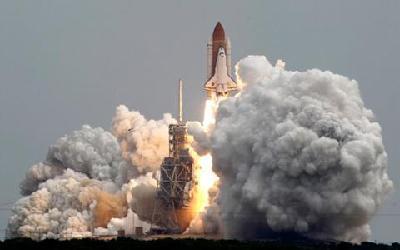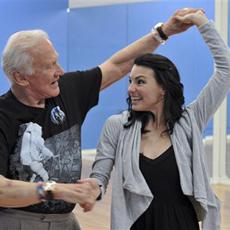
SHIRLEY GRIFFITH: Welcome to THIS IS AMERICA in VOA Special English. I'm Shirley Griffith.
CHRISTOPHER CRUISE: And I'm Christopher Cruise. This week on our program, we look at the American space program and its future. And we talk with Buzz Aldrin. Forty-two years ago this week, he became the second person ever to walk on the moon.
(MUSIC)
SHIRLEY GRIFFITH: Shuttle Atlantis is days away from landing in the history books as the last space shuttle flight. NASA, the National Aeronautics and Space Administration, is retiring the shuttles after 30 years. Huge crowds gathered on July 8th to watch the launch from the Kennedy Space Center in Florida.
NASA ANNOUNCER: " ... and liftoff -- the final liftoff of Atlantis. On the shoulders of the space shuttle, America will continue the dream."
ATLANTIS: "The program, Houston."
MISSION CONTROL: "Roger, roll, Atlantis."
SECOND NASA ANNOUNCER: "Houston now controlling the flight of Atlantis. The space shuttle spreads its wings one final time for the start of a sentimental journey into history."
Atlantis carried four astronauts and tons of supplies to the six crew members on the International Space Station. The cargo included science equipment, extra parts, clothing and a year's supply of food.
NASA is working with several companies to develop vehicles to replace the shuttles. Until then, Russian Soyuz spacecraft will carry Americans to and from the space station. Russian, European and Japanese cargo spacecraft will continue their resupply and waste disposal flights to the orbiting laboratory.
CHRISTOPHER CRUISE: The space station is in low-Earth orbit. NASA will turn its attention to deep space.
Space exploration creates science. But the space program also creates jobs. For the shuttle program, NASA came to depend mostly on workers from private companies instead of government employees. The remaining several thousand contractors have no guarantee of work now that the program is over.
Last year Congress ordered NASA to develop a new Space Launch System that could be powerful enough to rocket crews into deep space. But some in Congress want to cancel plans for the next-generation replacement for the orbiting Hubble Space Telescope. The James Webb Space Telescope, named for a former NASA chief, is late and over budget.
President George W. Bush set a goal to return to the moon by 2020, as the launching point for missions farther into space. President Obama canceled those plans. He announced his own plan for space exploration in a speech last year at the Kennedy Space Center.

BARACK OBAMA: "By 2025, we expect new spacecraft designed for long journeys to allow us to begin the first-ever crewed missions beyond the moon into deep space. [Applause] So we'll start -- we'll start by sending astronauts to an asteroid for the first time in history. [Applause] By the mid 2030s, I believe we can send humans to orbit Mars and return them safely to Earth. And a landing on Mars will follow. And I expect to be around to see it. [Applause]"
SHIRLEY GRIFFITH: The final launch of Atlantis was the 135th shuttle launch since 1981. Two shuttles were lost, killing 14 crew members.
CHRISTOPHER CRUISE: Challenger exploded shortly after launch. Columbia broke apart just minutes before it was supposed to land.
Plans call for Atlantis to spend its retirement at the privately operated Kennedy Space Center Visitor Complex. Endeavour and Discovery will go to museums. So will the Enterprise, a test shuttle that never flew in space. But for now -- and in this economy -- not much else appears settled about the future of the American space program.
In 2007 China launched its first moon orbiter. India followed the next year with its own scientific mission.
China may try to send a crew of "taikonauts" to the moon by 2025. A taikonaut orbited Earth on a Chinese-built rocket in 2003. China became the third country after the United States and the Soviet Union to use its own launch vehicle to send a person into space.
SHIRLEY GRIFFITH: The space age began as a race between enemies, the United States and the Soviet Union. In 1957 the Soviets put the first satellite, Sputnik, into orbit around the Earth.
CHRISTOPHER CRUISE: The Soviets also sent the first person into orbit, Yuri Gagarin, in April of 1961.
In May, President John Kennedy went before Congress. He urged the nation to set a goal to put astronauts on the moon by the end of the 1960s.
On July 20th, 1969, millions of people watched on live television as that goal was reached.
NEIL ARMSTRONG: "Houston, Tranquility Base here. The Eagle has landed."
SHIRLEY GRIFFITH: That was Neil Armstrong talking to Mission Control in Houston, Texas.
The landing craft was called the Eagle. It carried him and Edwin "Buzz" Aldrin to the surface in an area known as the Sea of Tranquility.
Shortly after the landing, Neil Armstrong climbed down from the Eagle.
NEIL ARMSTRONG: "That's one small step for man, one giant leap for mankind."
Michael Collins was the third astronaut on the Apollo 11 mission. He piloted the command module that orbited the moon while Neil Armstrong and Buzz Aldrin spent 21 hours on the surface. They were the first of 12 men, all Americans, who walked on the moon. The last moon landing was in December of 1972.
CHRISTOPHER CRUISE: After his NASA years, Neil Armstrong settled into a quiet life of teaching and business, away from public attention. But life for Buzz Aldrin took a turn for the worse.
Edwin Eugene Aldrin Junior was born in 1930 in New Jersey. His father was an early pilot. Both of them became Air Force colonels.
His sister had found it difficult to say "brother." Instead she said "buzzer," which became shortened to Buzz. Later in life, he legally changed his name to Buzz.
SHIRLEY GRIFFITH: Buzz Aldrin graduated third in his class from the United States Military Academy at West Point in New York. He was a fighter pilot in the Korean War who shot down two enemy fighters.
He earned a doctorate in aeronautics -- the science of flight -- at the Massachusetts Institute of Technology. He helped develop the use of underwater training to prepare astronauts to work in the weightless environment of space.
He first went into space as part of the Gemini 12 crew in November of 1966. He carried out a spacewalk that lasted more than five hours.
CHRISTOPHER CRUISE: Buzz Aldrin spent years preparing to go to the moon, but he was unprepared for the life that awaited him back on Earth.
Suddenly he was giving speeches to thousands of people. He was riding in parades, receiving awards, meeting world leaders, answering questions at press conferences. He had walked on the moon, and everyone had the same question: What was it like? It was all too much, he says.
BUZZ ALDRIN: "It did exact a toll on the change of a person's life and I didn't really relish that. But really, I shared with my first wife that if there was any preference, I'd just as soon be on a later mission. But that choice was really not up to me, and I wouldn't have traded the opportunity that I had to be a part of Apollo 11 or certainly anything that could have come along."
SHIRLEY GRIFFITH: The Air Force later put Buzz Aldrin in command of a school for test pilots. But he was a fighter pilot, not a test pilot, and not a very good commander. He retired from the Air Force within a year, in 1972.
He had spent 21 years on active duty. Now, all of a sudden, he had nowhere he needed to be, no mission, no structure in his life.
He and the other astronauts had been presented as supermen. He found that the people closest to him could not believe he was having a tough time.
He wrote about his problems, and the help he received from psychiatrists, in his 1973 autobiography "Return to Earth." But his life got worse. He published another book about it in 2009.
There was a history of depression in his family. His mother's father killed himself. And his mother -- who was named Marion Moon -- killed herself the year before the moon landing.
BUZZ ALDRIN: "Well, I had to live with who I was and what I inherited. And, as it turned out, I inherited genes from my mother's side of the family."
After two divorces, Buzz Aldrin again sought the help of a psychiatrist. He secretly entered a hospital for treatment of depression and alcohol abuse. He says he came to understand that while millions may have considered him a hero, he was just a man.
CHRISTOPHER CRUISE: Now, Buzz Aldrin spends much of his time supporting space tourism. He thinks more people should have the chance to travel into space. He has written two children's books to try to interest a new generation. And he has even put the message out through rap.
(SOUND)

Last year, at the age of 80, Buzz Aldrin performed on the television show "Dancing With the Stars."
The former astronaut says he would like to go back to the moon to see how the American flag he and Neil Armstrong planted there is doing. He believes people could land on Mars by 2031. He says nations should work together, just like with the International Space Station -- this time, to put colonies on the moon and Mars.
BUZZ ALDRIN: "We establish permanence -- not visits, not coming back, but this is settlers, these are colonists. It's like the Pilgrims on the Mayflower. They didn't hang around Plymouth Rock waiting for the return trip. The most efficient way to settle human beings some other place is to prepare that place and then go and begin to occupy it right from the very beginning."
(MUSIC)
SHIRLEY GRIFFITH: Our program was produced by Brianna Blake. I'm Shirley Griffith with Christopher Cruise, who wrote this week's show.
CHRISTOPHER CRUISE: What do you think of returning to the moon or colonizing Mars? Write to us at voaspecialenglish.com or on Facebook and Twitter at VOA Learning English. Join us again next week for THIS IS AMERICA in VOA Special English.
relish: to get great pleasure from something; to want very much to do or have something 享受;從…獲得樂趣;渴望;喜歡
US remembers 40-year anniversary of moon landing
Project mercury: The US space program begins
Space shuttle program nears an end
Five new planets discovered by NASA's Kepler Spacecraft
(來源:VOA 編輯:實習生高美)
